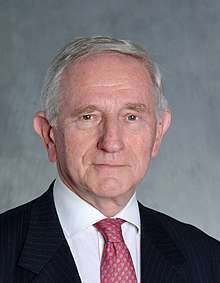Michael Sela
Michael Sela (Hebrew: מיכאל סלע; born Mieczysław Salomonowicz; 2 March 1924) is an Israeli immunologist of Polish Jewish origin. He is the W. Garfield Weston Professor of Immunology at the Weizmann Institute of Science in Rehovot.[1] He is a former President of the Weizmann Institute of Science.
Michael Sela | |
|---|---|
מיכאל סלע | |
 Michael Sela | |
| Born | Mieczysław Salomonowicz March 2, 1924 |
| Nationality | Israeli |
| Occupation | immunologist |
| Known for |
|
| Title | W. Garfield Weston Professor of Immunology at the Weizmann Institute of Science |
| Awards |
|
Birth and academic career
Michael Sela was born as Mieczysław Salomonowicz in Tomaszów Mazowiecki, Poland, in 1924.[2][3] In 1935 when he was 11 years old he and his family moved to Romania.[2][4] In 1941 when he was 17 years old he and his family made aliya and immigrated to Mandatory Palestine.[2][5] He studied at the Hebrew University of Jerusalem (M.Sc., Chemistry, 1946; Ph.D., 1954).[6]
Today, he is Professor in the Weizmann Institute's Immunology Department. He is a former President of the Weizmann Institute of Science, from 1975-1985.[7]
Research
Sela is known for his research in immunology, particularly for research on synthetic antigens, molecules that trigger the immune system to attack. This work of Sela has led to the discovery of the genetic control of the immune response, as well as to the design of vaccines based on synthetic molecules.
He was among the first who introduced the use of linear and branched synthetic polypeptides as antigens, and this brought about a better understanding of immunological phenomena.
For several decades, Sela has been interested in the possibility of fighting the autoimmune disease, experimental allergic encephalomyelitis (EAE) with synthetic analogs of the molecules in the myelin sheath of the brain which are capable of provoking the disease.
He is probably best known as the co-developer (with Ruth Arnon and Dvora Teitelbaum) of the multiple sclerosis drug copaxone.
Awards and honours
Sela has received several awards. Following are the major awards received by Sela.
- The Israel Prize in Life Sciences (1959)[8]
- Germany's Otto Warburg Medal (1968) [9]
- The Rothschild Prize (1968)
- Germany's Emil von Behring Prize (1973)
- Canada's Gairdner Foundation International Award (1980)
- France's Institut de la Vie Prize (1984)
- Germany's Commander's Cross of the Order of Merit Award (1986)
- France's Officier de l'Ordre de la Légion d'honneur (1987)
- Member (Hon. causa) of The Romanian Academy (Academia Română),[10] (1991).
- UNESCO's Albert Einstein Golden Medal (1995)
- Interbrew-Baillet Latour Health Prize of Belgium (1997)
- The Wolf Prize in Medicine (1998), along with Ruth Arnon, for "their major discoveries in the field of immunology".[11]
See also
References
- Michael Sela at the Weizmann Institute of Science
- "Oral History Project - Michael Sela". In.bgu.ac.il. Retrieved 2020-02-21.
- USA (2019-05-06). "Isolation and Characterization of Antibodies: the Work of Michael Sela". The Journal of Biological Chemistry. Ncbi.nlm.nih.gov. 285 (39): e12–e14. doi:10.1074/jbc.O110.000235. PMC 2943276.
- "Historical perspective: An interview with renowned Immunologist Dr. Michael Sela "
- "Prof. Michael Sela | Still hard at work, pursuing the understanding of immunology | WeizmannCompass". Weizmann.ac.il. 2017-06-04. Retrieved 2020-02-21.
- "Probing into the realm of proteins and immunity "
- "Prof. Michael Sela | Still hard at work, pursuing the understanding of immunology | WeizmannCompass". Weizmann.ac.il. 2017-06-04. Retrieved 2020-02-10.
- "Israel Prize recipients in 1959 (in Hebrew)". Israel Prize Official Site. Archived from the original on February 17, 2010.
- "Otto-Warburg-Medal". GBM. Archived from the original on 7 January 2019. Retrieved 12 January 2014.
- Membrii Academiei Române
- The Wolf Prize in Medicine Archived 2009-02-26 at the Wayback Machine